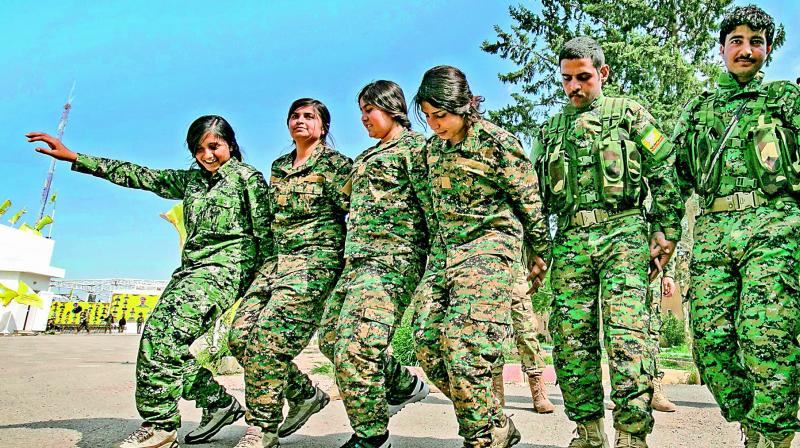Islamic State loses its last bastion
US-backed ally SDF captures Baghouz ending rule of IS’ self-proclaimed Caliphate.

Deir Al-Zor Province, Syria: US-backed forces said they had captured Islamic State’s last shred of territory in Syria at Baghouz on Saturday, ending its territorial rule over a self-proclaimed caliphate after years of fighting.
“Baghouz has been liberated. The military victory against Daesh has been accomplished,” Mustafa Bali, a Syrian Democratic Forces (SDF) spokesman, wrote on Twitter, declaring the “total elimination of (the) so-called caliphate”.
At a victory ceremony near Baghouz, a brass band in red uniforms with gold brocade played the American national anthem in front of a stars and stripes flag and yellow militia banners. SDF leaders including both men and women sat watching.
However, a Reuters journalist at Baghouz said some shooting and mortar fire continued on Saturday morning and an SDF commander warned that the coming phase in the struggle, with jihadist sleeper cells plotting mayhem, might be even harder. The final battle lasted weeks as huge numbers of civilians poured out, and for many Kurdish fighters in the SDF, victory was sweeter as it coincided with their “Now Ruz” new year.
Though the defeat of Islamic State in Baghouz ends the group’s grip over the jihadist quasi-state straddling Syria and Iraq that it declared in 2014, it remains a threat.
Some of its fighters still hold out in Syria’s remote central desert and in Iraqi cities they have slipped into the shadows, staging sudden shootings or kidnappings and awaiting a chance to rise again.
The US believes the group’s leader, Abu Bakr al-Baghdadi, is in Iraq. He stood at the pulpit of the great medieval mosque in Mosul in 2014 to declare himself caliph, sovereign over all Muslims.
Further afield, jihadists in Afghanistan, Nigeria and elsewhere have shown no sign of recanting their allegiance to IS, and intelligence services say its devotees in the West might plot new attacks. Still, the fall of Baghouz is a milestone in a fight against the jihadists waged by numerous local and global forces over more than four years.
It also marks a big moment in Syria’s eight-year war, wiping out the territory of one of the main contestants, with the rest split between President Bashar al-Assad, Turkey-backed rebels and the Kurdish-led SDF. Assad and his Iranian allies have sworn to recapture all Syria, and Turkey has threatened to drive out the SDF, which it sees as a terrorist group, by force.
The continued presence of American troops in northeast Syria might avert this. Oil production, extortion and stolen antiquities financed its agenda, which included slaughtering some minorities, public slave auctions of captured women, grotesque punishments for minor crimes and the choreographed killing of hostages.
Those excesses brought an array of forces against it, forcing it from Mosul and Raqqa in a year of heavy defeats in 2017 and driving it, eventually, down the Euphrates to Baghouz.

